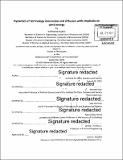Dynamics of technology innovation and diffusion with emphasis on wind energy
Author(s)
Dykes, Katherine L., 1980-
DownloadFull printable version (113.4Mb)
Other Contributors
Massachusetts Institute of Technology. Engineering Systems Division.
Advisor
Kenneth Oye.
Terms of use
Metadata
Show full item recordAbstract
This thesis takes an interdisciplinary look at wind energy innovation and diffusion through a historical case study and system dynamic quantitative model. The former uses a framework known as actor-network- theory (that allows technical as well social forces to shape historical outcomes) and applies it to an in-depth case study of the history of the technology throughout several époques. Rather than simplifying the story of the technology into a case of winners and losers, as past studies have done, this work demonstrates the complexity of the history of wind technology where many individuals in different countries, companies and national governments, all play a key role in both direct and indirect development of the technology. Without the confluence of activity from these different groups across time and space, the story of wind energy would be very different. In particular, the history shows how the technology develops and diffuses in different regions at different times in different eras, but that traces of each époque survive into the next so that the overall history of wind energy technology has some continuous threads and an accumulation of global learning. This perspective serves as a basis for the development of a system dynamics model of wind energy development and deployment. The model examines the interplay of technology innovation and diffusion dynamics where markets for the technology are local but innovation and learning is global. Wind energy for electricity generation has overcome significant volatility in local markets over the last several decades thanks to the global aggregation of demand from different countries at different times. At the same time, the persistent presence of a market somewhere in the world at any given time has allowed continuous innovation and technology learning to take place. Looking forward, these local and global feedbacks for innovation and diffusion have important implications for the further development of technology and its ability to become a prominent global source of electricity generation.
Description
Thesis: Ph. D. in Engineering Systems, Massachusetts Institute of Technology, School of Engineering, Institute for Data, Systems, and Society, 2016. Cataloged from PDF version of thesis. Includes bibliographical references.
Date issued
2016Department
Massachusetts Institute of Technology. Engineering Systems Division; Massachusetts Institute of Technology. Institute for Data, Systems, and SocietyPublisher
Massachusetts Institute of Technology
Keywords
Institute for Data, Systems, and Society., Engineering Systems Division.